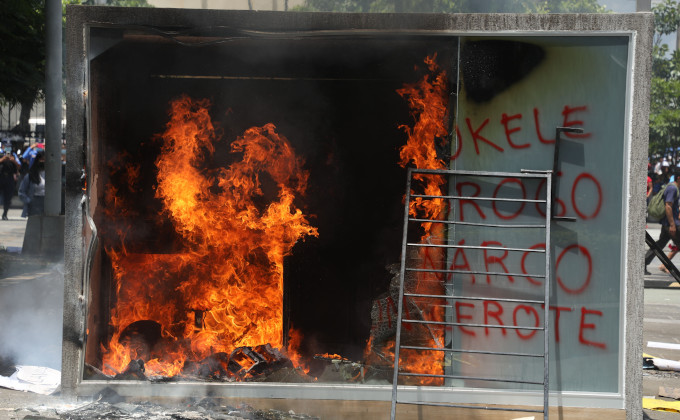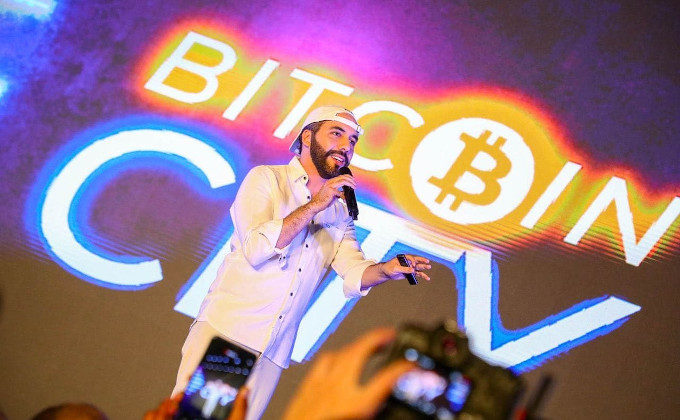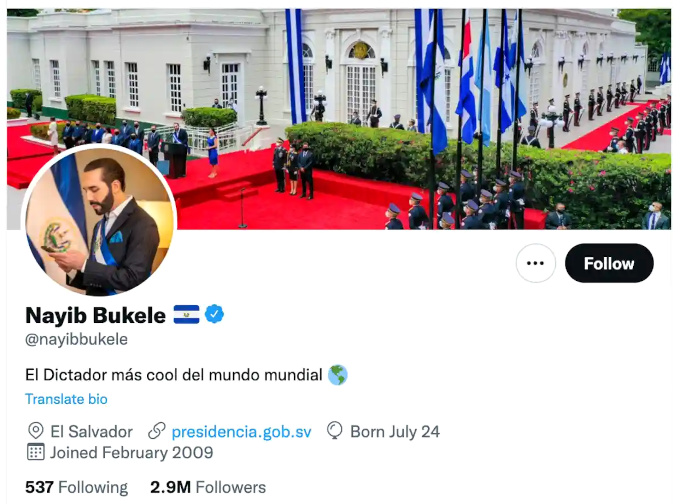El Salvador’s Bitcoin Law came into force on 7 September 2021 — and what a day it was!
A burning Chivo kiosk from a protest on 15 September 2021 … actually set alight as a false flag by government-sponsored provocateurs!
How’s bitcoin going, a year later?
- There’s almost no use of bitcoin as currency. The official Chivo Wallet is hardly used, and they never did get it working properly. Businesses have taken down their “we accept bitcoin” signs.
- There’s almost no use of bitcoin for remittances.
- Hundreds of millions of dollars in public funds have gone up in smoke — which is as if the US spent hundreds of billions — with nothing to show for it.
- Crypto crashed. As well as screwing over local bitcoin holders, this halved the face value of the government bitcoin reserve.
- El Salvador can’t borrow internationally. The IMF won’t talk to them while bitcoin is in place. The price of Salvadoran sovereign debt has fallen through the floor, as has El Salvador’s credit rating.
- The Bitcoin Volcano Bonds supposedly had $1.5 billion of buyer interest lined up — then Russia invaded Ukraine, and those buyers vanished.
- Ground has not been broken for Bitcoin City. I’m pretty sure it never will.
- A bunch of American so-called libertarians got flown around the country in military helicopters, though. Military escorts are the true meaning of liberty — for a few people.
Bitcoin is yet another failed initiative from President Nayib Bukele — a huge splashy announcement, a lot of money set on fire, and not much to show for it.
The big news in El Salvador right now is that Bukele put the country under a state of emergency (a “State of Exception” to the constitution), and has detained about 2% of the adult male population. He’s also building a giant new prison to keep these people in. And the country is running out of money. El Salvador has much bigger problems than bitcoin.
— Alecus (@Alecus62) September 6, 2022
Nobody uses bitcoin
“No one really talks about Bitcoin here anymore. It’s kind of been forgotten,” says former Banco Central de Reserva president Carlos Acevedo. “I don’t know if you’d call that a failure, but it certainly hasn’t been a success.” [Bloomberg]
Fernando Alvarez, David Argente and Diana Van Patten wrote up bitcoin in El Salvador, based on “a representative national face-to-face survey” earlier this year. The remaining users are young men who are into bitcoin for its own sake, and already have good access to banking. [David Argente, PDF]
In September, a survey by La Prensa Gráfica found that 27.6% of respondents had used the official Chivo wallet at all — but only 2.3% in the week up to the survey date. [La Prensa Gráfica, in Spanish]
Businesses in San Salvador confirm the downward trend in bitcoin usage. Merchants complain of Chivo still not working properly. A lot of merchants have stopped accepting bitcoin at all: “people don’t even ask about it any more. The truth is, it’s not profitable.” [elsalvador.com/AFP, in Spanish; elsalvador.com, in Spanish]
I’m told that most or all Chivo kiosks have been non-operational since around February — the public didn’t care once they had their $30 sign-up bonus. Here are photos of a Chivo kiosk being dismantled — supposedly to be moved elsewhere, though the new locations for the machines remained empty as of August. [Twitter; Elsalvador.com, in Spanish; Elsalvador.com, in Spanish]
Chivo and bitcoin have barely been used as a remittance channel. From September 2021 to June 2022, $108.9 million in remittances arrived via crypto wallets or Chivo. That’s just 1.9% of the $5.76 billion in total remittances received by Salvadorans over that period. [El Economista, in Spanish]
Where did the money go?
The bitcoin infrastructure seems to have been paid for out of previous borrowing. The State Financial Management Report for 2021, chapter 3, says the bitcoin project was financed from $375.9 million of loans previously taken out by the government. “CHIVO WALLET” is listed on page 27 of chapter 3. [La Prensa Gráfica, in Spanish; Portal de Transparencia Fiscal, archive, in Spanish, PDF; La Prensa Gráfica, in Spanish]
The crash in the price of bitcoin has led to local concern about how much money the country has lost on its bitcoin stash. You and I know that the money was lost when they bought the bitcoins — but the loss in face value is upsetting people. Zelaya’s response in June was “And how much did Funes steal? How much did former President Saca steal?” [Elsalvador.com, in Spanish]
In one of Bukele’s few tweets about bitcoin that were in Spanish, he said in June: “I see that some people are worried or anxious about the price of #Bitcoin in the market. My advice: stop looking at the graph and enjoy life. If you invested in #BTC your investment is safe and its value will grow a lot after the bear market. Patience is the key.” I’m sure that’s very comforting. [Twitter; AP]
#Alecus pic.twitter.com/YT7zH5xrOy
— Alecus (@Alecus62) September 14, 2022
Brother, can you spare a dime
Bukele spent money like water to make his voters happy. This did make his voters happy — if there was an election tomorrow, Bukele would win. The middle classes aren’t so keen on him, but the poor got some material resources, and they think he’s no more corrupt than any Salvadoran president has been.
But El Salvador doesn’t print its own money — the official national currency is the US dollar. This means the national budget has to balance every year. The country makes up the deficit by borrowing on the international financial markets.
I, and others, think bitcoin was an attempt by Bukele to print his own dollars — either by luring in bitcoins and treating them as dollars, or by creating unbacked dollars in the Chivo app. This was the theme of my first Foreign Policy piece on El Salvador’s bitcoin misadventure, in June 2021.
Bukele didn’t manage to print dollars with bitcoin. A lot of international loans are coming due. A default would be devastating, as it would be much harder for El Salvador to borrow again and find any interested lenders. Look at how the Bitcoin Bonds failed to find buyers.
An internal document from the Ministry of Finance in July set out three scenarios to avoid a default in 2023, maybe without help from the IMF — most likely sending the country from profligate public spending into austerity. One plan includes pension “reform” — i.e., stealing the pensions. Ricardo Valencia wrote a commentary thread on Twitter. [El Faro, in Spanish; Twitter]
In July, Bukele put forward a plan for El Salvador to buy its own distressed debt and write it off. The debt is currently trading at a stupendous discount — the 2023 bonds were around 75 cents on the dollar, and the 2025 bonds were around 30 cents.
Buying the bonds would be far cheaper than paying the bonds in full at maturity, and would avoid a default. Nigeria did something similar previously.
It’s a good idea in the circumstances — but the circumstances came from bad ideas.
The government issued a press release setting out the offer. 54% of 2025 bond holders were happy to sell up now — which was more than enough for the $360 million the government had on hand to spend. Fitch Ratings downgraded El Salvador from CC to CCC, though. [Bloomberg; press release; El Economista, in Spanish]
Don’t take me down to Bitcoin City
Bukele was going to build Bitcoin City, a libertarian charter city in La Unión, in the south of the country. This would be funded by Bitcoin Volcano Bonds, announced in November 2021. These would be administered by iFinex, the owners of the Bitfinex crypto exchange and the Tether stablecoin.
The Bitcoin Bonds supposedly had enough buyers for $1.5 billion in bonds. Russia invaded Ukraine … and then those buyers weren’t there any more.
I don’t have smoking gun evidence that the prospective buyers were sanctioned Russian billionaires, but the timing is interesting. Remember that sanctioned Russian billionaires included guys who tried to cash out $2 billion of bitcoins in a single sale, thinking that’s something you could do. So I’m sure Bukele or iFinex could have convinced at least a few of them that Bitcoin Bonds were a good idea.
iFinex CFO Paolo Ardoino told Fortune in August that the Bitcoin Bonds would be delayed until late 2022. “Ardoino said government officials have told him that they have a final draft, with passage expected in the next couple of weeks.” [Fortune]
Ground hasn’t been broken yet for Bitcoin City — and I would be surprised if it ever was — but the idea already got a thousand people marching in San Salvador on 7 June to protest the disastrous environmental impact that Bitcoin City would have. The important point here is that marching in the streets is back in fashion in El Salvador. [AFP, in Spanish]
Bukele’s Twitter bio from late September 2021
World’s coolest dictator
El Salvador has had no effective separation of powers for the past year. Bukele has subverted all institutions of civil society that could slow him down.
Bukele routinely puts anything he likes through the Legislative Assembly. He’s removed judges that were opposed to him, including the entire Constitutional Chamber of the Supreme Court. Bukele’s new Supreme Court, arguably illegally installed, issued an opinion that he can run for President again — despite the constitution limiting presidents to a single term. And he’s now declared his intention to run again. [El Faro]
The only remaining civil institution is journalism — and the government has tried to make reporting on the gangs illegal. Journalists have continued to report on the gangs, many of them from exile. [LA Times]
The “State of Exception” was declared in March, after a weekend with a remarkable number of murders. In May, news came out of audio of Bukele government officials negotiating with the gangs. The murders in March were because negotiations broke down. Élmer Canales Rivera, “Crook of Hollywood,” the national leader of the Mara Salvatrucha-13 (MS-13) gang, had an active order for extradition to the US. In fact, he was released in 2021, and escaped to Guatemala, then Mexico. [El Faro; El Faro]
Police have quotas to arrest a certain number of people, so they tend to grab poor-looking younger men with tattoos. Local human rights organisation Cristosal reports thousands of arbitrary arrests. Most detainees have little or no communication with their families, who have to go looking for them in the prison system. [Enfoca, PDF, in Spanish]
The arrest of Mario de la Cruz Peña García got a lot of attention — because he’s a famed Bitcoin Beach street vendor selling “Minutas Bitcoin,” where he charges a few satoshis for shaved ice. He was detained because he had decades-old gang tattoos from his wayward youth. He was released after considerable protest. [Elsalvador.com, in Spanish]
Bukele arrested political tweeter Luis Rivas, “El Comisionado,” for tweeting a picture of the president’s brother, Karim Bukele, getting a presidential police escort to the beach while not in fact even being a government official. The charge is “contempt.” Rivas tweeted a whole thread of Chivo problems in December 2021. [Vice; Twitter]
Bukele is building a jail for more than 40,000 prisoners — a “Centro de Confinamiento del Terrorismo” (Terrorism Confinement Centre) in San Vicente. Now, you might think that described some sort of concentration camp. The prison is being built by Omni Inversiones, who were also involved in the Chivo Pets veterinary hospital. [Elsalvador.com, in Spanish; La Prensa Gráfica, in Spanish]
What do actual gang members do? They use bitcoin. Yonatan Josué Obando Pleitez was arrested in July on allegations of being a gang member linked to a structure extorting money via Chivo Wallet. Police seized $50,000 in cryptocurrencies and $20,000 in cash. [La Prensa Gráfica, in Spanish]
Bukele also appeared on Tucker Carlson’s show on Fox News to talk himself up as tough on crime, and protest how unfair the Biden administration is to him. [Twitter]
Other summaries of the year of bitcoin
There are many good articles on the failure of bitcoin in El Salvador. [Washington Post; Rolling Stone; Daily Telegraph; Politico]
The one in New Scientist includes quotes from me and Mario Gómez. [New Scientist]
Ben MacKenzie and Jacob Silverman’s piece in The Intercept is particularly good, based on a visit to El Salvador. [The Intercept]
Scam Economy has a couple of episodes on El Salvador and Bitcoin – with Mario Gómez, and one just released with Domingo Flores. These are required listening. [YouTube; YouTube]
Ricardo Valencia is a Salvadoran living in California. He regularly comments on the situation at home. He wrote a summary of the year of bitcoin for Univision. You should follow his tweets and his pieces in El Faro. [Univision; Twitter; El Faro, in Spanish and English]
Next episode: all the ridiculous detail I couldn’t fit into this post!


